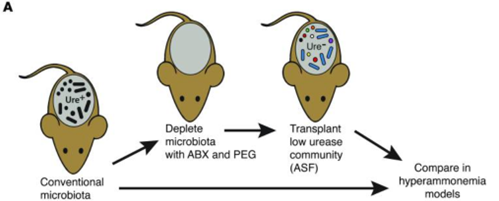Problem:
Urease is an enzyme found in human gut bacteria that hydrolyzes urea into ammonia. High levels of bacterial urease are associated with inflammatory bowel disease (IBD). Moreover, the increased ammonia resulting from urease activity can worsen symptoms for patients dealing with hyperammonemia – a condition associated with severe consequences such as brain edema, neurological impairment, liver dysfunction, and even death. Despite available treatments, managing IBD and hyperammonemia remains challenging as many patients develop treatment resistance.
Solution:
Bacterial urease levels found in the gut microbiota can be altered by engineering the gut microbiome. Here, the inventors identified a microbial consortium that has minimal urease activity.
Technology :
An altered Schaedler flora (ASF) with low urease activity was transplanted into conventional mice pretreated with antibiotics resulting in decreased urease activity and ammonia levels. Reduction of urease activity and ammonia was associated with reduced mortality and cognitive impairment in mice. While this technology was initially used to demonstrate efficacy in hyperammonemia, it shows promise for potential applications in the treatment of other urease-associated diseases such as IBD.
Advantages:
- Potential for better disease control and reduction of disease associated complications.
- As microbial consortia stably colonize, has potential for longer term remission.

(A) Diagram of the experimental method.
Stage of Development:
- Functional data in murine in vivo models
- Associations in human subjects
Case ID:
14-6818-tpNCS
Web Published:
8/18/2023
Patent Information:
| App Type |
Country |
Serial No. |
Patent No. |
File Date |
Issued Date |
Expire Date |